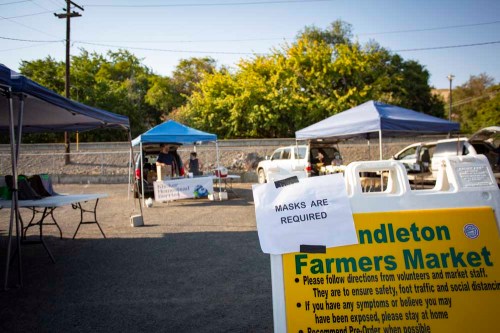Farmers market rides out the summer of 2020
Published 6:00 am Tuesday, September 8, 2020

- A sign indicates masks are required at the Pendleton Farmers Market in Pendleton on Friday, Sept. 4, 2020.
PENDLETON — It’s a sweet memory.
Patrons of the Pendleton Farmers Market wandering along Main Street, inspecting fresh produce by picking it up or bending low to sniff the aroma. The sound of live music. Children chattering happily at the craft area. The smell of meat sizzling on the grill.
Hal McCune, president of the Pendleton Farmers Market, is nostalgic about years past, but upbeat about the current season. Customers have adapted admirably as the market shape-shifted because of COVID-19.
“People have adjusted pretty well,” McCune said. “We’re definitely down a little bit in both vendors and patrons from last season, but not terribly. Our vendor sales are down, but not significantly, considering we started a month later than normal. The crowds have gotten better and better as the summer has gone along.”
Early on, organizers scrambled to find a new location when the city denied access to the usual spot on Main Street in March. Pendleton City Manager Robb Corbett explained that allowing the market to set up on Main would violate a prohibition on gatherings of more than 25 people and go against the governor’s effort to encourage residents to stay home.The group didn’t push back after the decision though farmers markets are technically considered essential businesses that provide food to communities the way grocery stores do.
After regrouping, the market opened in early June at a large parking lot near the Pendleton Riverwalk at the former Elks Lodge on Southeast Third Street. Owner Lance Leonnig charged the market one dollar a month and gave vendors access to water and electricity.
The carefree ambience of past summers is noticeably absent. Shoppers don’t linger long, McCune said. They get in and get out. About 90% of them wear masks.
“People are doing a good job of shopping and heading home,” he said. “We’ve encouraged them not to hang around.”
Patrons have learned not to touch the fruits and vegetables.
“They just point,” McCune said.
Statewide, the profit picture is mixed, said Amanda Cross, programs manager for the Oregon Farmers Market Association. The group is collecting data from five farmers markets around the state in Albany, Baker City, Clatskanie, Manzanita and Umpqua Valley (Roseburg), hoping to identify trends. The data from the second quarter showed a large variation.
“Across all markets, sales were down 10%,” Cross said, “but the spread was from down 78% to up 4%.”
Two of the markets depend on tourists, who are showing up in fewer numbers this year. Some of the markets converted to online sales, which gave patrons the opportunity to order ahead but involved some effort to learn the new process. A couple of the markets delayed opening while getting their protocols in place.
“It’s a lot of change and each community is reacting differently to that change,” Cross said.
She also has heard anecdotally from farmers market managers that more customers are using SNAP benefits (commonly know as food stamps) to buy produce.
“They are telling me that SNAP sales are way up because a lot of people are on SNAP for the first time now,” she said. “This is part of the fallout of what’s happening with COVID-19 and the economy.”
McCune said Pendleton SNAP sales in the first three months stayed fairly constant at $5,693, compared with $6,064 last season. Matching programs — which potentially double the amount that SNAP customers spend on fresh and local foods — added $2,800 both years.
Cross said many of the farmers market organizations are struggling financially.
“Because there are fewer vendors at farmers markets right now and markets make their income off vendor fees, market budgets are suffering,” Cross said. “So though it seems like vendors are doing OK, the markets themselves are going to be struggling with decreases in budgets.”
McCune said the Pendleton Farmers Market is staying afloat by not paying for weekly music, not covering the cost of food samples and nixing plans to hire an assistant manager. For the first time, the nonprofit dipped into savings to cover operating expenses. Despite that, McCune said he isn’t worried.
“Overall, we’re going to be OK, thanks to great vendors and solid public support,” he said.
McCune expects the market will return to Main Street next season.
“Both vendors and patrons want to go back to Main Street,” he said, “but they’re grateful for any market at all.”









